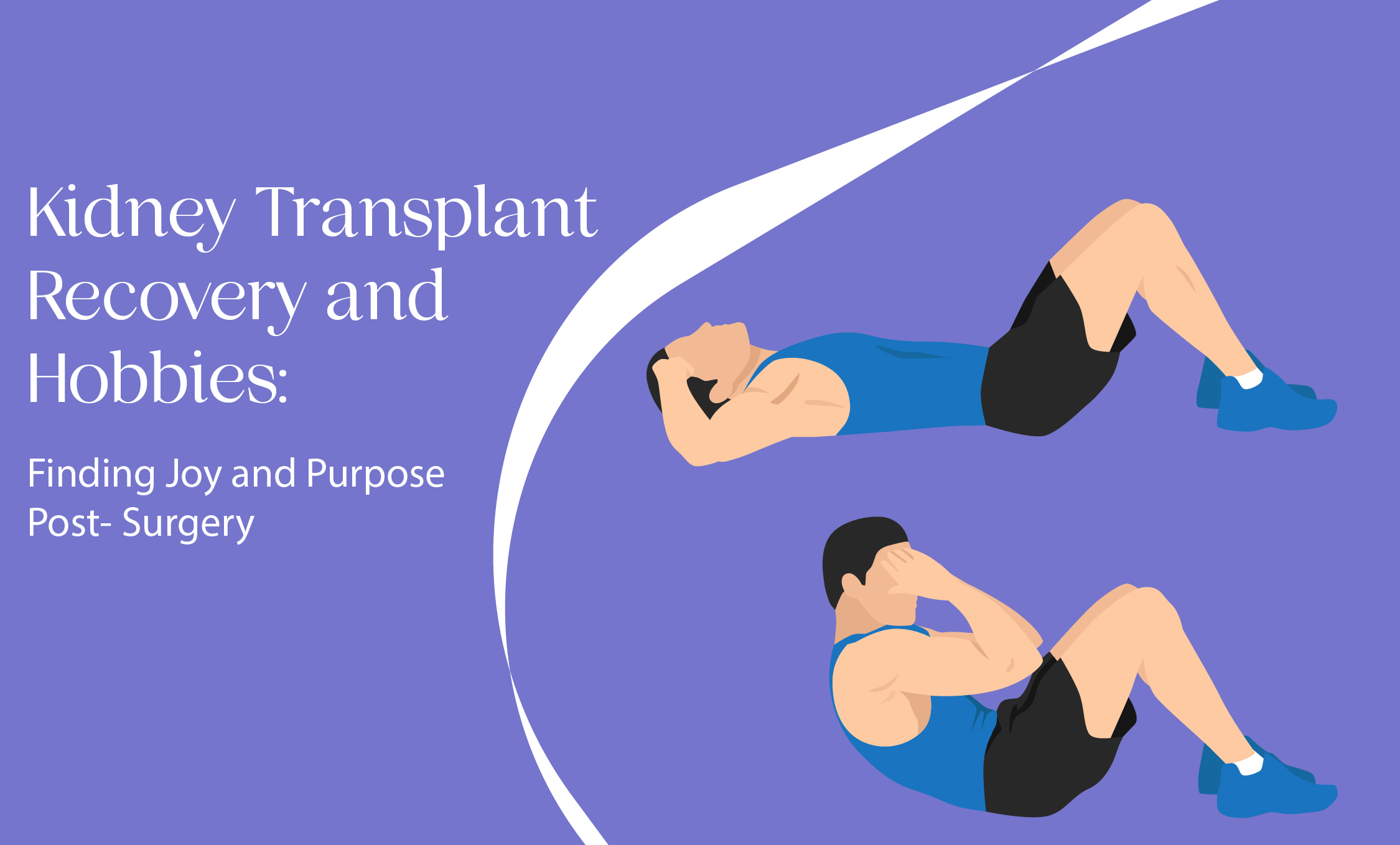
Rediscovering Joy and Purpose after Kidney Transplant through Hobbies
A kidney transplant is life-changing. It offers patient a second chance at living a healthier life, free from burden of dialysis and restriction of kidney disease. While the journey post-surgery requires medical care and lifestyle adjustments, it’s equally important to focus on emotional well-being. Engaging in hobbies can be a great way to regain sense of joy, happiness, and fulfillment.
Understanding Kidney Transplant
Recovery:
Before diving into the role of hobbies, it’s essential to
understand the recovery process after a kidney
transplant. The first few weeks and months are critical after the surgery. During this
period, the body
adjust to the new kidney, and patients need to take medications to prevent the body from
rejecting the
organ.
Dr. Vijay Patel, with years of experience in guiding patients
through the recovery journey, suggest a
structured approach to healing. According to him, patients can expect the following timeline
post-
surgery:
- First
month:
Frequent follow-ups with the doctor, monitoring vital signs, and ensuring well that
the body is responding well to the transplant.
- Months 2-3:
Wgradual improvement in strength and stamina. Patients can slowing start
resuming
regular activities.
- After 6 months:
Most patients feel significantly better and can return to work, hobbies and
even
physical activities under medical guidance:
Buy beyond physical recovery, mental and emotional well-being plays a crucial role. Dr.
Patel advises
incorporating hobbies as a part of the recovery process.
Preventing kidney stones involves a combination of dietary choices and lifestyle modifications. By staying hydrated, monitoring calcium and oxalate intake, controlling sodium, moderating animal protein consumption, boosting citrus intake, and maintaining a healthy weight, individuals can significantly reduce their risk of developing kidney stones. Always consult with a healthcare professional or a registered dietitian to tailor dietary recommendations based on individual health needs and conditions. Adopting these dietary tips can contribute to kidney health and overall well-being.
The Importance of Hobbies in Post- Transplant Life:
Hobbies are not the just the way to pass time- the can significantly improve mental health, reduce stress, and create a sense of achievement. For kidney transplant patients, engaging in enjoyable activities is a step towards reclaiming their life.
- Emotional healing: After a major surgery, patients often feel anxious or overwhelmed. Hobbies like painting, reading or knitting can provide a peaceful distraction, helping to alleviate stress.
- Building confidence: Post- surgery, patients might feel fragile or uncertain about their abilities. Hobbies especially those that involves learning new skills, can help rebuild self-esteem.
- Physical improvement: Certain hobbies like gardening or light exercise, can help improve physical strength, flexibility, and stamina, supporting the body’s recovery.
- Connecting with others: Social hobbies such as joining club or engaging in group activities, allow patients to interact with others, which is vital for mental health and combating loneliness.
Safe and Enjoyable Hobbies Post-Kidney Transplant:
It’s essential to choose hobbies that align with your health status and energy levels. Dr. Vijay Patel advises patient to consult their doctor before starting any new activity, but here are some hobbies that are generally considered safe and beneficial for kidney transplant patients.
- Walking and Nature Exploration: walking is one of the safest and most recommended physical activities post-transplant. It helps improve circulation, strengthens muscles, and boost overall well-being. Exploring nature, whether through walking in a park or hiking on easy trails, is also beneficial for mental clarity. Being surrounded by greenery and fresh air can improve mood and reduce anxiety. For patients recovering from surgery, even short walks around the neighborhood can be starting point. Over time, these walks can be extended as strength improves.
- Art and Craft: Expressing Emotions through Creativity: creativity can be a powerful outlet for emotions. Post-surgery patients often experience a mix of feeling, from relief and gratitude to anxiety and uncertainty. Engaging in artistic hobbies like painting, sketching or pottery provides an avenue to express these emotions constructively. Arts allow patient to focus on the present moment, helping them stay mindful and reducing feeling of worry. It also offers a sense of accomplishment, especially when patients see the final result of their creative work.
- Reading and Writing: Expanding the Mind: books have a unique ability to transport readers to different world, making reading an excellent hobby for transplant patients during their recovery. Whether it’s fiction, non-fiction, or self-help, reading can help keep the mind engaged, distracted from ant discomfort, and inspired to think beyond the present challenges. For those enjoy writing, keeping a journal or writing a blog about their recovery journey can be therapeutic. Writing offers a chance to reflect, process emotions, and even inspire others going through similar experiences.
- Light Physical Activities: Yoga light activities like yoga are excellent for kidney transplant patients once they are cleared for exercise by their doctor. These activities focus on gentle movements, stretching, and controlled breathing, promoting flexibility and relaxation without straining the body. Dr. Vijay Patel often recommends yoga as a post-recovery hobby because it helps patients regain their strength while also calming the mind.
- Volunteering: Finding Purpose in Helping Others: for many transplant patients, the experience of undergoing surgery can instill a sense of gratitude and desire to give back. Volunteering can be a fulfilling way to find purpose after kidney transplant. Whether it’s helping in local community center, mentoring others, or participating in kidney health awareness campaign, volunteering provides a way to contribute to society. Helping others not only boost self-worth but also strengthens emotional resilience, which is crucial during the recovery period.